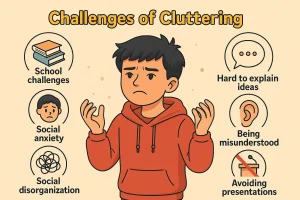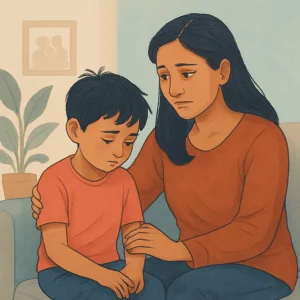Exploring Speech Development Stages in Children with Autism
By Wellness Hub
Last Updated: November 28, 2024
Autism Spectrum Disorder presents unique challenges in speech and communication, with each child following a distinct developmental path. Recognizing the speech development stages in children with autism is crucial, as it guides effective interventions and supports tailored to individual needs. This understanding not only aids in fostering better communication skills but also ensures that each milestone achieved is appropriately supported and celebrated. Join us as we explore these stages and the impactful approaches to nurturing speech development in autism.
Early Speech Development in Autism
Identifying Early Stages of Speech in Autistic Children
Parents often wonder about the early signs of speech delays in children with autism. These signs can vary but commonly include little to no babbling by the first birthday, limited use of gestures like pointing or waving, and sometimes repeating phrases without understanding them. Spotting these early signs is crucial as it helps tailor specific communication strategies that align with each child’s unique development.
Role of Early Intervention in Speech Development
Starting speech therapies early can significantly benefit children with autism. Early intervention taps into a child’s developmental potential when they are most receptive to learning new skills. These programs not only enhance speech clarity and vocabulary but also teach essential social communication skills. Engaging in these interventions early helps improve a child’s ability to interact and connect with others, boosting their confidence and social skills from a young age.
Key Speech Development Stages in Autistic Children
Non-Verbal to Verbal Transition
Helping non-verbal children start talking involves using strategies that let them express their needs without words initially. Tools like sign language, picture cards, and communication apps are great for this. They help reduce frustration and encourage kids to try speaking. Over time, these children often begin to use words and phrases to share their thoughts, learning from the communication they see around them.
Building Basic Communication Skills
When non-verbal children show interest in speaking, it’s important to support their new skills with simple, effective techniques. Using clear, repetitive language helps them understand and use words themselves. Engaging activities like singing, playing simple games, and including speech in daily routines can also boost their learning. Keeping sessions fun and focused on what each child enjoys can motivate them to keep trying new words and eventually build sentences, improving how they communicate with others.
Enhancing Speech Through Therapy
Role of Speech Therapy in Autism
Many parents and caregivers ask, “What role does speech therapy play in autism?” Speech therapy is crucial as it directly addresses the various communication challenges that children with autism face. This type of therapy is tailored to meet each child’s specific needs, helping them to improve their verbal, non-verbal, and social communication skills. Speech therapists use a variety of techniques to encourage language development and enhance the ability to communicate effectively with others. This targeted support is vital for helping children express their needs, share their thoughts, and participate more fully in daily interactions.
Speech Therapy Techniques for Autism
Speech therapy for autism involves a range of specialized techniques designed to engage children and stimulate speech and language development. Some of these techniques include:
- Visual Supports: Using images and visual schedules to improve understanding and communication.
- Social Stories: Creating customized stories that teach social norms and behaviors.
- Joint Attention Therapy: Encouraging a child to share focus with others on objects or activities, which is fundamental for developing communication skills.
- Echoic Training: Helping children to imitate sounds and words to improve their articulation and verbal skills.
Overcoming Challenges in Speech Development
Common Speech Development Challenges
Speech development in children with autism comes with its unique set of challenges. One of the major issues is the delay in speech milestones, which can range from delayed babbling in infancy to the absence of forming complete sentences as they grow. Other challenges include difficulties with articulation, limited vocabulary, and echolalia—where a child may repeat phrases without understanding their meaning. Addressing these challenges in speech development for children with autism requires a tailored approach that can adapt to the varying needs of each child. Solutions often involve a combination of speech therapy, environmental adjustments, and sometimes, assistive technologies that enhance communication.
How Parents Can Support Speech Development at Home
Parents play a crucial role in supporting their child’s speech development. Here are a few practical tips on how parents can support speech development in autistic children:
- Create a Communicative Environment: Engage with your child using simple, clear language and encourage any attempt at communication, be it words, gestures, or expressions.
- Use Visual Supports: Since many children with autism are visual learners, using pictures and visual schedules can help them understand and use language.
- Incorporate Play: Integrating speech development activities into play can make learning more natural and enjoyable. Simple games like naming body parts on a doll or creating stories with toy figures can stimulate language use.
- Be Patient and Consistent: Consistency is key in any form of learning. Regular practice and patience can lead to gradual but impactful improvements.
- Seek Professional Guidance: Collaborating with speech therapists who can provide personalized strategies and exercises to do at home can be highly beneficial.
The Role of Communication Tools in Speech Development
Using PECS and Other Communication Aids
The Picture Exchange Communication System is a great tool for children with autism who find verbal communication challenging. PECS uses pictures to help children communicate their needs and desires. This method teaches them to hand over a picture to express what they want, making communication clearer and more direct.
Benefits of using PECS include:
- Improves Communication: Helps children express what they want without frustration.
- Supports Language Skills: Links pictures with words, aiding in language development.
- Encourages Independence: As children learn to use PECS, they feel more confident and self-reliant.
- Develops Social Skills: Introduces important social skills like taking turns.
Conclusion
Navigating speech development for children with autism involves patience, the right tools, and effective strategies. From recognizing early speech delays to using aids like PECS and targeted speech therapy, every step helps children express themselves better. At Wellness Hub, we provide innovative therapies tailored to each child’s needs, supporting their journey towards improved communication.
Frequently Asked Questions:
1. What are the first signs of speech delay in children with autism?
Early indicators include not babbling as an infant, not using gestures like pointing or waving by the first birthday, delayed response to their name, and a general lack of verbal communication compared to peers.
2. How can speech therapy help children with autism?
Speech therapy assists in developing verbal and non-verbal communication skills, enhances understanding and use of language, and teaches social communication strategies. Therapists use tailored activities to meet each child’s specific needs, helping them communicate more effectively.
3. What is PECS and how does it support children with autism?
The Picture Exchange Communication System (PECS) is a tool that uses pictures to help children communicate without needing verbal speech. Children learn to give a picture to express their needs, helping them build basic communicative skills and reducing frustration.
4. Can my child with autism learn to speak if they are non-verbal?
Many non-verbal children with autism can develop some level of speech with appropriate interventions. Speech therapy, combined with other communication supports, can significantly aid in developing verbal abilities over time.
5. What role do parents play in the speech development of their autistic child?
Parents are vital in reinforcing communication skills. Regular, everyday interactions and structured activities at home can significantly support a child’s speech development. Consistency and patience are key in helping your child progress.
6. What are some simple activities to support speech development at home?
Engaging your child in daily reading, using visual aids like flashcards, singing, and incorporating speech into routine activities can be very beneficial. These activities enhance vocabulary, pronunciation, and understanding of language in context.
7. How often should my child with autism attend speech therapy sessions?
Typically, speech therapists recommend sessions once or twice a week depending on the child’s specific needs. However, some children might benefit from more frequent sessions, especially in the initial stages of therapy.
8. What are the benefits of early intervention for autism speech development?
Early intervention programs can drastically improve communication skills, making it easier for children to interact with others and reducing potential behavioral issues associated with frustration and misunderstanding.
9. How can I tell if speech therapy is effective for my child with autism?
Signs of effective speech therapy include noticeable improvements in your child’s ability to follow instructions, increased vocabulary, better eye contact, and overall more active engagement in social interactions.
10. Where can I find more resources on speech development for children with autism?
Our website offers a dedicated Autism Resource Center where you can find a variety of educational materials, therapy tools, and support resources specifically designed for children with autism and their families.
About the Author:
Rajini Darugupally
M.Sc., Speech-Language Pathologist (9+ years of experience)
Rajini is a passionate and dedicated Speech-Language Pathologist with over 9+ years of experience, specializing in both developmental speech and language disorders in children and rehabilitation in adults. Currently, at Wellness Hub, she thrives in a team environment that values innovation, compassion, and achieving results for their clients.
Book your Free Consultation Today
Parent/Caregiver Info:
Client’s Details:
* Error Message









